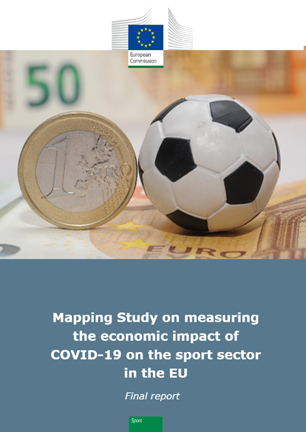
The economic impact of COVID-19 on the sport sector in the EU: key findings from the latest report by the European Commission
The economic impact of COVID-19 on the sport sector in the EU: key findings from the latest report by the European Commission
The European Commission recently published a report on the economic impact of COVID-19 on the sport sector in the EU, with an aim to help the industry tackle the socio-economic challenges resulting from the ongoing pandemic.
 The report examines the impact of COVID-19 under three different scenarios — higher, medium, lower — with the ‘higher’ one currently being the most likely scenario. These scenarios are contrasted with a reference scenario simulating a situation in which the pandemic did not occur. The report assesses impacts through both direct and indirect effects; the former referring for example to paying salaries, and the latter including indirect effects such as those arising in the supply network. The total effect is the aggregate of direct and indirect effects.
The report examines the impact of COVID-19 under three different scenarios — higher, medium, lower — with the ‘higher’ one currently being the most likely scenario. These scenarios are contrasted with a reference scenario simulating a situation in which the pandemic did not occur. The report assesses impacts through both direct and indirect effects; the former referring for example to paying salaries, and the latter including indirect effects such as those arising in the supply network. The total effect is the aggregate of direct and indirect effects.
Key findings suggest that the sport sector will be significantly impacted by the COVID-19 pandemic in 2020 despite measures being taken to mitigate its negative effects. Looking at total effects, the overall impact of COVID-19 is estimated to be between 79,641 and 99,168 million Euros GDP and between 1,279,274 and 1,588,456 employees (sport-related employment). In comparison to the reference scenario, and under the ‘higher’ scenario estimates, this represents a 15.7% and 16.5% drop respectively.
EU member states are affected differently by the pandemic at the national level, depending on the size of total sport-related GDP per country, the importance of the sport sector, and measures put in place to respond to the pandemic, among other things. Under the ‘higher’ scenario, Germany has the largest estimated decrease in direct sport-related GDP (total figures of 34,154 million EUR), followed by the United Kingdom (20,038 million EUR) and France (8,571 million EUR). Czechia is the only member state estimated not to see their sport-related GDP decline by at least 10% in 2020 under this scenario.
The impact of COVID-19 also varies across the sport sector, which consists of different sub-sectors. The financial effects on the health sector for example are estimated to be both positive and negative, since reduced physical activity is likely to result in short-lasting decrease in injuries but also in long-term negative health outcomes. For sport events and sport journalism, COVID-19 is expected to have a strong effect, with the duration of that effect depending on the size and/or type of event.
 The report provides several recommendations to mitigate the economic impact of the ongoing pandemic. This includes for example making funds available, investigating the development of a coordinated EU plan, and developing digital options in sport offerings. It also recommends to “embed sport in economic and social development strategies, and leverage broader cross-sectoral links, especially with public health, green agenda and other relevant areas”. It is said explicitly that “any focus on public health should stress the economic benefits and wider societal impact of physical activity”, thus acknowledging the societal and social impact of sport beyond the economic dimension.
The report provides several recommendations to mitigate the economic impact of the ongoing pandemic. This includes for example making funds available, investigating the development of a coordinated EU plan, and developing digital options in sport offerings. It also recommends to “embed sport in economic and social development strategies, and leverage broader cross-sectoral links, especially with public health, green agenda and other relevant areas”. It is said explicitly that “any focus on public health should stress the economic benefits and wider societal impact of physical activity”, thus acknowledging the societal and social impact of sport beyond the economic dimension.
Since the beginning of the pandemic, Sport and Citizenship has remained actively engaged in discussions concerning the social and societal impact of COVID-19 in relation to the sport sector. Back in April for example, we signed the Position paper on the impact of the COVID-19 crisis on the sport sector, along with other SHARE members and sport organisations.
